If you're a frequent visitor to Healthify, why not share our site with a friend? Don't forget you can also browse Healthify without using your phone data.
Fats and oils
Key points about fats and oils
- Fat is an essential macronutrient found in both plant and animal foods.
- Fat gives your body energy and has many jobs including forming the structure of cells and transporting vitamins and antioxidants around your body.
- For good health, you should aim to reduce 'unhealthy' saturated and trans fats – found in fatty meats, pastries, cakes, hot chips, butter and cream.
- Replace this with 'healthy' polyunsaturated fats found in nuts, seeds, oily fish, avocado and olive oil.
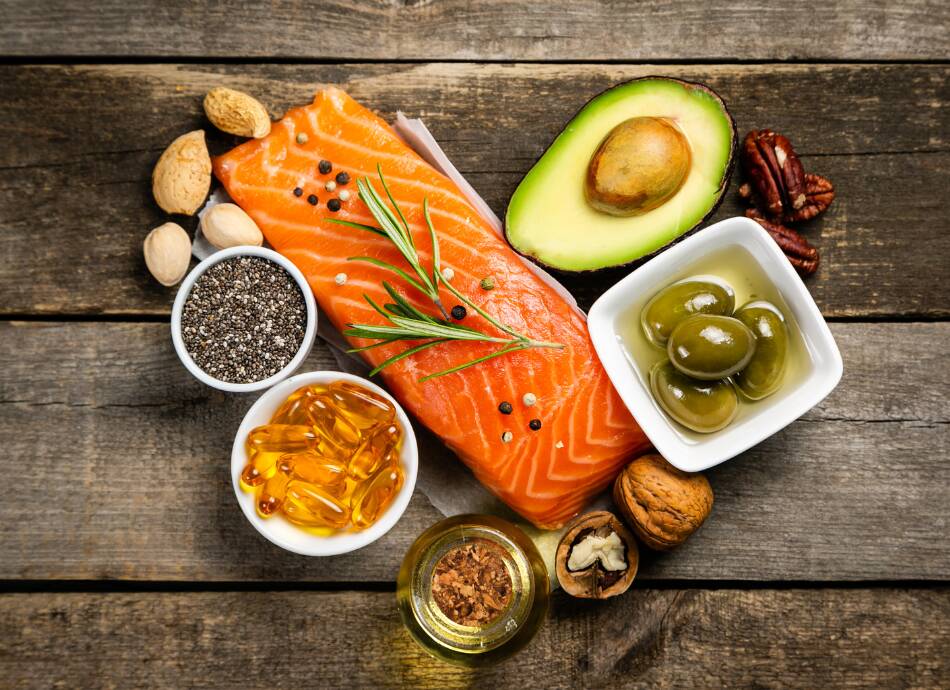
Fat is an essential macronutrient. There are different types of fats found in both animal and plant foods.
Getting the right balance of how much and what type of fat to eat is important. It's better for your heart and brain to eat mostly plant-based fats and oils (except coconut and palm oils) instead of animal-based fats and oils such as butter and meat fat.
Fats have a number of jobs in your body:
- They're major sources of energy.
- Fat provides you with essential omega 3 and 6 fatty acids which can't be made by your body.
- Fat makes up the structure and function of cell membranes.
- It makes sure you absorb the fat-soluble vitamins (A, D, E and K) and fat-soluble antioxidants (eg, lycopene and beta-carotene).
Fat is found in a wide range of foods. Many foods will have different amounts of fat but will be rich in 1 particular type of fat.
Saturated fats:
- butter
- cream
- visible meat (eg, chicken skin)
- processed meats
- palm oil
- coconut oil
- coconut cream
- takeaway and deep-fried foods
- snack foods like chips
- ghee
- lard
- dripping
- shortening (eg, Kremelta)
- cocoa butter.
Trans fats:
- biscuits, cakes and pastries
- butter
- takeaway foods, such as hamburgers, pizza and hot chips
- packaged foods that list ‘hydrogenated oils’ or ‘partially hydrogenated vegetable oils’ in the ingredients list.
Monounsaturated fats:
- almonds
- avocado
- olives
- nuts – cashew, hazelnut, macadamia, pistachio, peanut
- oils – olive oil, almond oil, canola oil, avocado oil, rice bran oil, peanut oil
- margarines.
Polyunsaturated fats:
- oily fish such as salmon and mackerel
- nuts – Brazil nuts, pine nuts, walnuts
- seeds – linseed (flaxseed), sesame seeds, sunflower seeds, pumpkin seeds
- oils – flaxseed oil, sesame oil, grapeseed oil, sunflower oil, sunflower oil, soybean oil
- wheatgerm
- wheatgerm oil.
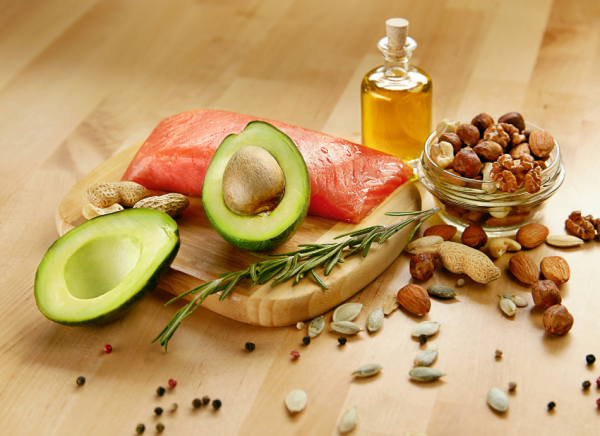
Image credit: Canva
Different foods contain different combinations of fats. For good health we need to reduce our intake of foods high in saturated and trans fats and replace this with foods high in mono and polyunsaturated fats.
Saturated fats
Saturated fat is found in animal-based foods such as butter and cream, and the white fat on meat such as pork, lamb, chicken and beef. It’s also found in coconut and palm oils and a wide range of processed foods and takeaway foods including pies, burgers and chips. When you regularly eat too much saturated fat you produce more ‘bad’ low density lipoprotein (LDL) cholesterol, which can form plaque in your arteries and increase your risk of cardiovascular disease and stroke.
Many processed and fast foods are not only high in saturated fat, but they also contain high amounts of kilojoules (calories), which can lead to weight gain and further increase your heart disease risk.
Controlling your LDL cholesterol level is the best known way of lessening your risk of coronary heart disease, so eating fewer of the foods that contain large amounts of saturated fat is an important way to do this.
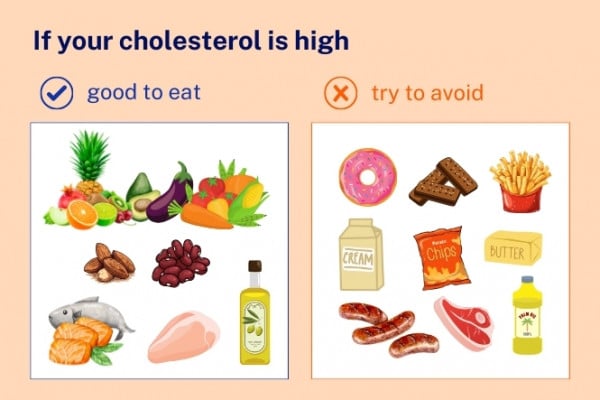
Image credit: Healthify He Puna Waiora
Trans fats
Trans fats are an unhealthy type of fat. These fats increase levels of ‘bad’ low density lipoprotein (LDL) cholesterol and lower ‘good’ high density lipoprotein (HDL) cholesterol which means they're not good for heart health.
Most of the trans fats eaten in Aotearoa New Zealand are from processed foods such as biscuits and deep-fried foods. Trans fats are also found naturally in some foods such as dairy and some meat products.
Trans fats are listed on food labels as ‘hydrogenated oils’ or ‘partially hydrogenated oils’. Over time there has been a reduction in their use by the food industry however you may still see them in some processed or packaged food products.
Unsaturated fats
Unsaturated fats include monounsaturated and polyunsaturated fats. Omega-3 and omega-6 fats are types of polyunsaturated fat.
Unsaturated fats come mainly from plants. They're in foods such as seeds, nuts, avocados, canola and olive oil, and plant-based margarines. Some unsaturated fats come from animals, including oily fish such as salmon, tuna, mackerel and sardines.
Eating these foods helps to reduce LDL cholesterol and increase HDL cholesterol in your blood which is good for your heart health.
Reducing saturated fat intake and replacing it with unsaturated fats, in particular polyunsaturated fats, is linked with a decreased risk of heart disease.
It is recommended that adults get:
- between 20 and 35% of their total energy from total fat – this may seem like a lot but keep in mind fat is energy dense.
- less than 1% of their total energy from trans fat
- less than 10% of total energy from saturated fat
Remember all different types of fat are energy-dense which means they contain a lot of calories.
Eating a lot of fat can mean that it's easy to take in more energy (kilojoules) than you need, which in turn can lead to weight gain. This is the case even if you're eating mostly fats.
The best sources of fat are whole foods such as nuts, seeds, avocado, olives and oily fish. It’s best to focus on the quality and type of fat you eat.
Vegetable oils, such as olive oil and sesame oil, can be included as part of an overall healthy diet but just remember they'll still add energy to your diet.
Add healthy fats to your meals
- Have a small handful of nuts as a snack instead of chips or crackers.
- Spread peanut butter onto sliced fruit like apple or banana.
- Use fish or seafood instead of bacon, luncheon or deli meats (ham).
- Toast almonds, walnuts, sunflower or pumpkin seeds and add to salads for extra crunch.
- Add cashew nuts or sesame seeds to a stir-fry and pine nuts or walnuts to a pasta dish.
Swap to healthy fats when cooking and preparing food
- Use avocado, nut butter, tahini or hummus as a spread instead of butter.
- Use olive oil, sesame oil, peanut oil or sunflower oil instead of coconut oil, butter or ghee.
Reduce the saturated fat of your meals
- Swap from full fat milk to low and reduced fat milks.
- Swap from coconut cream to ‘lite’ coconut cream or coconut milk
- Choose meat with little visible fat (white bits or skin) or remove the fat before cooking.
- Cook meat in a way that removes rather than adds fat, eg, grill, roast or bake it and put meat on a rack so fat can drip off during cooking.
- Choose salad and vegetable based healthier takeaway options instead of deep-fried options (chips, fried chicken etc).
It is always best to get nutrients from the food you eat. However, a fish oil supplement may be recommended by your healthcare provider if you don't eat any fish and seafood, or if you don't get enough omega-3 fats from plant foods such as chia seeds and walnuts.
There's wide variety in the type and dosage of omega-3 supplements available. Some fish oil supplements may also contain a lot less omega-3 than is claimed on the label.
There's some evidence to suggest that eating more fish oil slightly lowers your risk of coronary heart disease, myocardial infarction and death from cardiovascular disease.
People taking blood thinning medicines or anticoagulants such as aspirin or warfarin need to check with their doctor before taking fish oil supplements because high doses of omega 3 fats can have a blood thinning effect.
Choosing cooking oils(external link) Heart Foundation NZ
Guide to eating for a healthy heart(external link) Heart Foundation, NZ
Eating and activity guidelines for New Zealand adults(external link) Ministry of Health, NZ
Dietary fat(external link) Better Health Channel, Australia
Nuts and seeds for heart health(external link) Heart Foundation, NZ
Apps
Nutrition, exercise and weight management apps
Brochures
Eating for a healthy heart(external link) Heart Foundation, NZ
Choose a balance of healthy food every day poster [JPG, 147 KB] Health New Zealand | Te Whatu Ora
Behind the hype – butter(external link) Health Promotion Agency, NZ
Behind the hype – coconut oil(external link) Health Ed and Health Promotion Agency, NZ
Choose the right cheese(external link) Heart Foundation, NZ
References
- Eating and activity guidelines for New Zealand adults(external link) Ministry of Health, NZ, 2020
- Clifton PM, Keogh JB. A systematic review of the effect of dietary saturated and polyunsaturated fat on heart disease(external link) Nutr Metab Cardiovasc Dis. 2017 Dec;27(12):1060–1080
- Nuts and seeds for heart health(external link) Heart Foundation, NZ
- Rucklidge JJ, Shaw IC. Are over-the-counter fish oil supplements safe, effective and accurate with labelling? Analysis of 10 New Zealand fish oil supplements(external link) NZ Med J. 2020 Sep 25;133(1522):52–62
- Albert BA, Derraik JGB, Cameron-Smith D, et al. Fish oil supplements in New Zealand are highly oxidised and do not meet label content of n-3 PUFA(external link) Sci Rep. 2015;7928
- Abdelhamid AS, Brown TJ, Brainard JS, et al. Omega‐3 fatty acids for the primary and secondary prevention of cardiovascular disease(external link) Cochrane Database of Systematic Reviews 2020;Issue 3
- Yan J, Liu M, Yang D, et al. Efficacy and safety of omega-3 fatty acids in the prevention of cardiovascular disease – a systematic review and meta-analysis(external link) Cardiovasc Drugs Ther. 2024 Aug;38(4):799-817
- Khan, SU, Lone AN, Khan MS. et al. Effect of omega-3 fatty acids on cardiovascular outcomes – a systematic review and meta-analysis(external link) eClinicalMedicine 2021;38:100997
Brochures
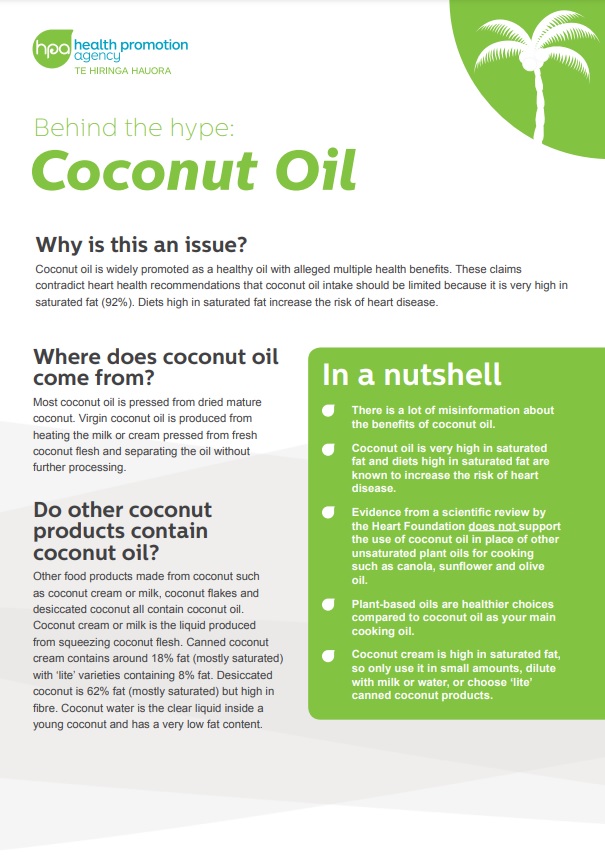
Health Ed and Health Promotion Agency, NZ, 2022
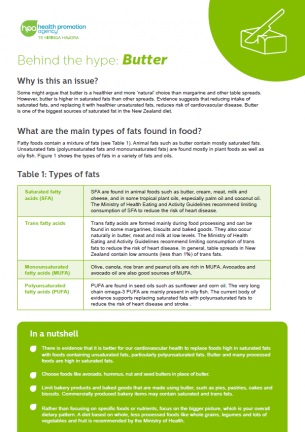
Health Promotion Agency, NZ, 2022
Credits: Healthify editorial team. Healthify is brought to you by Health Navigator Charitable Trust.
Reviewed by: Lily Henderson, Registered Dietitian
Last reviewed:






